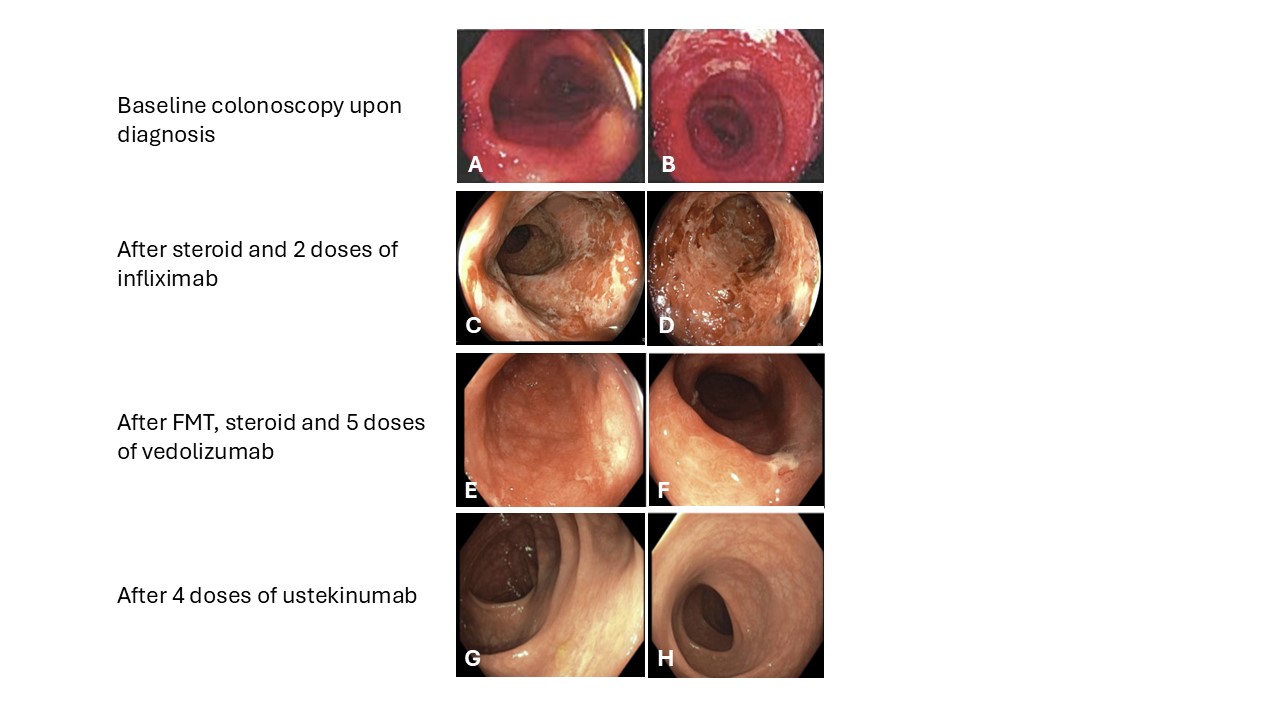Sunday Poster Session
Category: Colon
P0402 - Refractory Immune Checkpoint-Related Colitis/Diarrhea Requiring Multiple Lines of Potent Immunosuppressants
- KV
Krishnavathana Varatharajalu, MD
MD Anderson Cancer Center
Houston, TX
Presenting Author(s)
1University of Texas MD Anderson Cancer Center, Houston, TX; 2MD Anderson Cancer Center, Houston, TX; 3University of Texas Health, McGovern Medical School, Houston, TX
Introduction:
Immune checkpoint inhibitors (ICI) improved treatment success for many cancers. They also exhibit immune-related adverse events (irAE), commonly diarrhea/colitis that frequently require immunosuppressants. We report a case with prolonged refractory and complicated disease course that eventually resolved after multiple-lines of immunosuppressants.
Case Description/
Methods:
A 52-year old male with stage IV tonsillar squamous cell cancer received 3 cycles of pembrolizumab, carboplatin and docetaxel, followed by lobectomy. Subsequently, he developed CTCAE grade 3 diarrhea and grade 2 colitis, with abdominal pain and fecal urgency/incontinence. Given no infection, and suspicion for ICI induced colitis, he was hospitalized and received steroid and 2 doses of infliximab without improvement. His cancer therapy was discontinued. Baseline colonoscopy at colitis onset showed diffuse friable mucosa with bleeding and ulceration (Fig1). Pathology indicated marked acute colitis. Calprotectin was 265mcg/g. Fecal transplantation (FMT) was performed on a clinical trial one month later. However, he had persistent grade 3 diarrhea that led to second hospitalization with prolonged stay of 48 days. Given lack of response from FMT, patient was transitioned to iv steroid and vedolizumab within one week and continued for 5 doses with fluctuating symptoms. His hospitalization was complicated by C. difficile infection, treated with vancomycin, and thrombosis in left thigh requiring anti-coagulation. Follow up sigmoidoscopy revealed multiple scattered aphthae and edema. Calprotectin post-discharge was still elevated at 444mcg/g. Treatment was then switched to ustekinumab. After 4 doses, he eventually achieved symptom response with 1-2 soft to formed stools a day, resolution of abdominal pain, hematochezia, mucus, fevers, with appetite and weight gain. Calprotectin dropped to 34.8mcg/g. Last colonoscopy confirmed the mucosal healing (Fig1) at 13 months after colitis. His cancer is in remission requiring only surveillance.
Discussion:
We report a case of ICI-induced colitis with a complicated, refractory disease course lasting over a year despite ICI termination, that failed corticosteroids, infliximab, and vedolizumab, with significant morbidity. Ultimately, remission was achieved with ustekinumab. This case highlights the need for clinicians to recognize aggressive disease behavior early and make informed, timely decisions in management to improve patient outcomes.
Figure: Endoscopic Findings
Disclosures:
Yinghong Wang indicated no relevant financial relationships.
Krishnavathana Varatharajalu indicated no relevant financial relationships.
Tanvi Gupta indicated no relevant financial relationships.
Yinghong Wang, MD, PhD, MS1, Krishnavathana Varatharajalu, MD2, Tanvi Gupta, MD3. P0402 - Refractory Immune Checkpoint-Related Colitis/Diarrhea Requiring Multiple Lines of Potent Immunosuppressants, ACG 2025 Annual Scientific Meeting Abstracts. Phoenix, AZ: American College of Gastroenterology.
